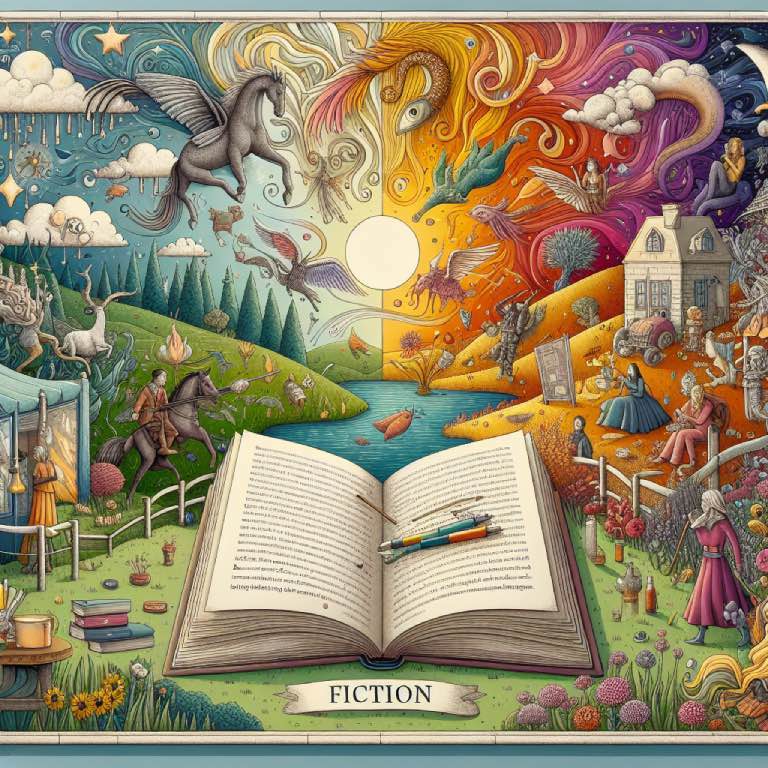- Cognitive Benefits
– Enhances creativity and problem-solving abilities
– Improves brain connectivity and mental flexibility
– Sharpens social cognition and understanding of complex scenarios - Educational Advantages
– Expands vocabulary and enhances writing and comprehension skills
– Encourages deeper comprehension and critical thinking - Emotional Intelligence
– Fosters empathy by exposing readers to diverse perspectives
– Enhances social acuity and emotional intelligence - Cultural Awareness
– Broadens understanding of different cultures and historical contexts
– Promotes inclusivity and respect for cultural differences - Stress Reduction
– Provides an escape from reality, reducing stress and muscle tension
– Triggers a relaxation response in the body - Entertainment Value
– Offers intricate plots and unexpected twists
– Forms emotional connections with characters, making the reading experience both thrilling and thought-provoking - Personal Growth
– Encourages self-reflection and understanding of different lives
– Delves into moral questions and ethical quandaries, promoting self-awareness - Inspiring Creativity
– Stimulates imagination through unique characters and settings
– Encourages innovative thinking and problem-solving
Has a book ever captivated you so much that you had to stay up all night to finish it? Or, have you ever been so moved by a character’s plight that you found yourself tearing up, even if you knew that it was just a fictional story? That’s the magic of fiction, and it has a special power that no other kind of literature can match.
The debate over which category of literature offers greater benefits is age-old, yet recent studies and literary critiques suggest that fiction has unparalleled advantages that extend beyond mere entertainment. When it comes to reading, we often assume that acquiring knowledge is the primary reason to pick up a book. However, research suggests that the benefits of reading fiction go beyond knowledge acquisition—while nonfiction delivers factual information, stories transport readers into imagined worlds, evoking emotions and stimulating the mind in unique ways.
This article delves into the characteristics that make reading fiction worthwhile, exploring its profound impact on our cognitive function and mental well-being. By becoming aware of these advantages, readers will be better able to appreciate fiction’s power and its essential role in our lives.
Fiction Characteristics
Fiction refers to literature created from imagination rather than fact. It encompasses a wide range of genres, including novels, short stories, and novellas. Fiction often involves invented characters, settings, and plots. Unlike nonfiction, which presents factual information, fiction aims to tell a story that can entertain, provoke thought, or convey deeper truths through metaphor and allegory.
Fiction’s ability to transport readers into different worlds and perspectives acts as a simulatory experience that sharpens decision-making and problem-solving abilities. This immersion helps with memory enhancement and boosts creative thinking skills. Studies suggest that engaging with fictional narratives fosters better relationships and can even impact real-life behaviors and attitudes positively.
The benefits extend beyond personal growth, influencing societal dynamics as well. Individuals who regularly read fiction are more likely to engage in civic and social activities, promoting social equity and compassion within communities. This illustrates the far-reaching impact of fictional literature on shaping a more empathetic and cohesive society.
Fiction or Nonfiction?
The discussion about fiction vs. nonfiction revolves around their various merits. Fiction is uniquely powerful in fostering empathy, as readers inhabit different perspectives and worldviews. Studies have shown that fiction readers develop better social understanding and theories of mind. Nonfiction, while informative, lacks the narrative techniques that engage readers emotionally and imaginatively. Fiction’s imaginative aspects can help readers escape reality, reduce stress, and enhance cognitive functions like critical thinking and creativity.
Types of Fiction
Readers can explore diverse categories of fiction, each offering unique experiences and benefits. Different categories, such as genres and styles, whether literary or genre fiction, and forms of fiction like novels and short stories, broadly divide fiction.
Genres and Styles
Fiction genres include mystery, science fiction, fantasy, romance, and horror. Each genre provides distinct narratives and emotional engagement. For instance, mystery novels engage readers with clues and suspense, stimulating thought processes and attention to detail. Fantasy and science fiction, on the other hand, expand imaginative dimensions, transporting readers to otherworldly settings. Romance and horror, meanwhile, elicit deep emotional responses—from love to fear—which could help develop emotional intelligence.

Genres can blend, creating sub-genres like historical fantasy or romantic suspense that cater to more specific tastes. With these myriad types of fiction, readers can gain multi-faceted insights into the human condition, making fiction a powerful tool for understanding diverse perspectives.
Literary Fiction vs. Genre Fiction
Literary fiction often focuses on deep character development and thematic complexity, employing innovative and often experimental writing techniques. It is lauded for its artistic value and its keen exploration of the human condition. Authors like Toni Morrison, James Joyce, and Fyodor Dostoevsky exemplify this genre, as their works compel readers to engage with complex philosophical inquiries and to question deeply ingrained cultural beliefs.
Conversely, genre fiction—encompassing mysteries, thrillers, and fantasy—primarily emphasizes plot and entertainment. In these categories, authors such as Agatha Christie and J.K. Rowling are popular. Genre fiction often attracts readers looking for engaging, fast-paced stories.
Both types of fiction offer valuable experiences, as literary fiction hones introspection and empathy, while genre fiction fosters imagination and relaxation.
Novels and Short Stories
Due to their length, novels allow for a more extensive character and plot development, providing readers with immersive engagement with the text. Epic sagas like War and Peace (1867) or contemporary novels like The Goldfinch (2013) offer in-depth narratives that can span various themes and complex story arcs. This prolonged engagement with characters and settings deepens readers’ connections and understanding.
Short stories, such as those by Edgar Allan Poe or Alice Munro, offer concise yet powerful glimpses into characters and situations. They are bite-sized bursts of literary brilliance, whose brevity often necessitates precise and evocative language.
Benefits of Reading Fiction
Fiction draws readers by transporting them to worlds where the boundaries between truth and fantasy blur and imagination reigns supreme. Unlike nonfiction, which typically conforms to specific facts and real-life situations, fiction allows a creative opportunity for readers to study other views and experiences.
This section looks into the benefits of reading fiction, exploring how it captivates the reader’s imagination, elicits emotions, and improves our understanding of humanity. By losing ourselves in these imaginary worlds, literature can work its way to have a significant impact on our lives.
Cognitive Benefits
Fiction immerses readers in worlds beyond their reality, stimulating creativity. When individuals read about diverse characters, settings, and events, their ability to visualize complex scenarios improves. This imaginative exercise enhances creativity, proving beneficial for problem-solving and innovation.
By delving into intricate narratives and complex emotions, literary fiction, in particular, pushes readers’ imaginative boundaries, making them more adaptable and inventive in real-life situations. For example, picturing a fantastical universe or empathizing with a character’s struggle hones one’s ability to envision novel solutions and possibilities.

Reading fiction also results in neural changes that enhance various cognitive functions. Studies indicate that reading about actions and sensations activates the same brain regions involved in real-life experiences. This stimulation fosters improved brain connectivity, particularly in the default-mode network.
The engagement with intricate narratives and diverse perspectives found in fiction enhances mental flexibility and sharpens social cognition. Consistently reading fiction can lead to a more interconnected and efficient brain, capable of quick and nuanced understanding of complex scenarios and social cues.
Educational Advantages
In terms of education, reading fiction offers numerous benefits, especially in vocabulary expansion and the enhancement of writing and comprehension skills. These advantages, uniquely tied to the immersive nature of narrative tales, make fiction a powerful educational tool that is too often neglected.
Engaging with fiction exposes readers to a wide range of vocabulary in various contexts. Fiction often uses descriptive language and settings, introducing words not commonly seen in everyday conversation or in most nonfiction books. Regularly reading fiction can potentially provide an ongoing opportunity to learn new terminology and expressions that enhance both spoken and written communication.
Furthermore, encountering new vocabulary within the flow of a story helps readers internalize their meanings naturally. This contextual learning reinforces memory retention and understanding. Readers are honed to decipher meanings through character speech, narrative descriptions, and plot developments.
Reading fiction, with its multifaceted plots and rich characterizations, also encourages deeper comprehension. It augments readers’ ability to grasp complex concepts, track multiple storylines, and infer deeper meanings—skills essential for academic success. Fiction’s requirement for sustained attention and reflection aids in developing robust comprehension abilities that benefit various areas of education and beyond.
Writing and Comprehension Skills
By exposing readers to different writing styles, narrative techniques, and character development strategies, fiction is able to cultivate writing skills. Authors of fiction often employ unique structures, engaging openings, and vivid descriptions, which readers can analyze and emulate.
Studying these elements can improve their ability to write compellingly and creatively. Additionally, fiction requires readers to follow intricate plots, understand character motives, and deduce implied meanings. This, in turn, boosts the reader’s critical thinking and reading comprehension.
Emotional Intelligence
Reading fiction can significantly enhance emotional intelligence by fostering empathy and the ability to navigate complex emotions. It has a powerful effect on developing empathy because it exposes readers to inner lives of characters, allowing them to experience situations from multiple points of view.
Studies have shown that engaging with fictional narratives results in increased social acuity and emotional intelligence. Research conducted by Oatley and his colleagues demonstrates a correlation between fiction reading and better performance on empathy-related tests. This suggests that fiction uniquely prepares readers to understand and share the feelings of others, unlike nonfiction, which usually focuses more on factual information.
Moreover, fiction often involves intricate emotional scenarios that require readers to navigate and process complex feelings. For example, through the detailed internal monologues of characters, readers can explore emotional complexities that mirror real-life situations. The act of mentally exploring these narratives enhances one’s ability to deal with similar emotions in reality. Fiction, therefore, offers a safe space to practice and improve emotional regulation, making readers more adept at understanding their own emotional terrain.
Cultural Awareness
By engaging with diverse narratives and historical contexts, reading fiction broadens the reader’s understanding of different cultures and eras. Through the eyes of characters from different backgrounds, readers can experience unfamiliar traditions, languages, and customs, unlike nonfiction, which presents cultures in a more clinical manner. The emotional connection induced by reading fiction can lead to a deeper appreciation and respect for cultural differences, promoting inclusivity.

Another aspect of fiction that expands cultural awareness is its ability to intertwine with historical settings, providing rich backdrops that educate readers about past events and social mores. Authors skillfully embed historical details within their narratives, making history accessible and engaging. This method brings life to historical figures and events, offering insights that textbooks might miss.
Lastly, fictional stories can reveal the socio-political climates and everyday lives of people from bygone eras, enhancing one’s understanding of how history shapes modern culture. By contrasting different times, readers gain a nuanced perspective on contemporary issues.
Stress Reduction
Reading fiction has a significant impact on stress reduction because it provides an escape from reality and triggers a body relaxation response. A 2009 study reveals that readers in general experience lower stress levels due to the escapism it provides. The study found that activities like reading reduce muscle tension and decrease heart rate more effectively than listening to music or drinking tea.
Readers can temporarily forget their worries by immersing themselves in stories. This mental break is beneficial because it allows the mind to rest and reset. The engrossing nature of fiction can calm the mind, significantly reducing stress markers in the body.
By focusing on an imaginative narrative, the reader’s brain signals the body to relax. Nonfiction typically requires cognitive engagement with real-world information, making this effect less common. Fiction’s ability to evoke emotional involvement and mental detachment makes it superior for stress alleviation.
Entertainment Value
A significant appeal of fiction lies in the enjoyment of narrative. Fictional stories offer intricate plots and unexpected twists that captivate readers. Fiction often draws readers with its creative storytelling, encompassing everything from fantasy realms to intense mysteries. The suspense and curiosity to find out what happens next keep readers hooked, making the reading experience both thrilling and satisfying.
The connection readers form with fictional characters is another key aspect of fiction’s entertainment value. Often, authors portray characters with depth, showcasing a spectrum of emotions and personal development throughout the narrative. This allows readers to empathize with their experiences and dilemmas.
Investing emotionally in characters can provide a sense of companionship as readers follow their journeys and development. The characters’ relatable struggles and triumphs can also lead readers to reflect on their own lives, making the experience both entertaining and thought-provoking.
Personal Growth
Reading fiction provides individuals with unique opportunities for personal growth by encouraging self-reflection and allowing them to experience different lives. By immersing themselves in fiction, readers can gain deeper insights into their own emotions and behaviors. Characters’ experiences often mirror real-life challenges, enabling readers to confront their own dilemmas and feelings in a safe, detached manner.
Fiction also often delves into moral questions and ethical quandaries, encouraging readers to reflect on their own values and beliefs. This kind of introspection can lead to greater self-awareness and can help one navigate complex social and personal situations with more clarity.
Fiction opens windows to diverse experiences and perspectives. For instance, reading about a character from a different culture or era can challenge preconceived notions and broaden one’s horizons, encouraging a more open-minded approach to life. This simulated experience can enhance one’s problem-solving skills by exposing them to various ways of thinking and living, which can be crucial in both personal and professional settings.
Inspiring Creativity
Reading fiction stimulates the imagination in ways that nonfiction can’t match. When you read fiction, you engage with unique characters, diverse narrative structures, and imaginative settings. This exposure to a variety of fictional worlds broadens your thinking; it encourages readers to visualize scenarios and concepts that don’t exist in the real world.

When fictional stories introduce readers to different viewpoints, this diversity of thought prompts them to consider new perspectives, fueling their innovative capabilities. Thus, fiction serves as a fertile ground for cultivating inventive ideas that can be drawn upon in real-life situations.
Fictional narratives often involve complex plot lines and character dilemmas that require imaginative solutions. Readers participate in this process by mentally navigating the characters’ problems. By attempting to solve these fictional problems, readers practice and refine their cognitive flexibility. This mental exercise helps them prepare for real-life challenges.
Creative Nonfiction: The Synergy of Fiction and Nonfiction
Interestingly, the benefits of fiction and nonfiction are not mutually exclusive. Nonfiction can also engage the reader’s imagination and empathy, particularly through well-crafted narratives that bring real events and people to life. For example, creative nonfiction blends the factual accuracy of real-life situations with the narrative techniques of fiction, creating compelling stories that are both informative and emotionally engaging. This category of literature leverages the strengths of both fiction and nonfiction, providing a rich reading experience that educates while also captivating the reader’s imagination.
Reading fiction and nonfiction together can provide a more holistic understanding of the world, demonstrating their synergy. Fiction can offer a visceral, emotional experience of an event or issue, while nonfiction can provide factual context and deeper analysis. Reading both genres allows for a more comprehensive exploration of themes and ideas, enhancing the reader’s overall understanding and empathy.
While fiction excels at fostering imagination and emotional connection, nonfiction can achieve similar benefits through engaging narratives and thought-provoking content. At the nexus of these categories, creative nonfiction showcases the amalgamation of fiction and nonfiction, resulting in potent and enriching reading experiences.
From enhancing cognitive abilities and educational outcomes to improving writing and comprehension skills, fiction offers a rich tapestry of advantages. It nurtures emotional intelligence by allowing readers to experience diverse perspectives and emotions, thereby fostering greater cultural awareness and understanding. The stress-reducing qualities of fiction, combined with its entertainment value, provide a much-needed escape from the pressures of daily life, contributing significantly to overall well-being.
Moreover, one cannot overstate the personal growth and creativity that fiction inspires. Whether through the intricate plots of novels or the concise brilliance of short stories, fiction challenges readers to think critically and creatively, often leading to profound insights and new ways of seeing the world.
The synergy between fiction and nonfiction, particularly through the lens of creative nonfiction, highlights how these genres can complement each other. Creative nonfiction blends the factual rigor of nonfiction with the narrative flair of fiction, creating compelling stories that educate and entertain simultaneously. This intersection enriches the reading experience, demonstrating that the benefits of fiction and nonfiction are not mutually exclusive but rather, when combined, can offer a more comprehensive and fulfilling exploration of ideas.
Whether you are delving into the imaginative worlds of fiction or the factual terrains of nonfiction, the act of reading itself is a journey of discovery and enrichment. Embracing both genres allows for a well-rounded literary experience that cultivates knowledge, empathy, and creativity, making the case for reading fiction—and indeed, reading in general—undeniably strong.
Further Reading
The Case for Reading Fiction by Christine Seifert, Harvard Business Review
Reading Fiction Improves Brain Connectivity and Function by Christopher Bergland, Psychology Today
Does reading fiction make you a better person? by Sarah Kaplan, The Washington Post
Your Brain on Fiction by Annie Murphy Paul, The New York Times




